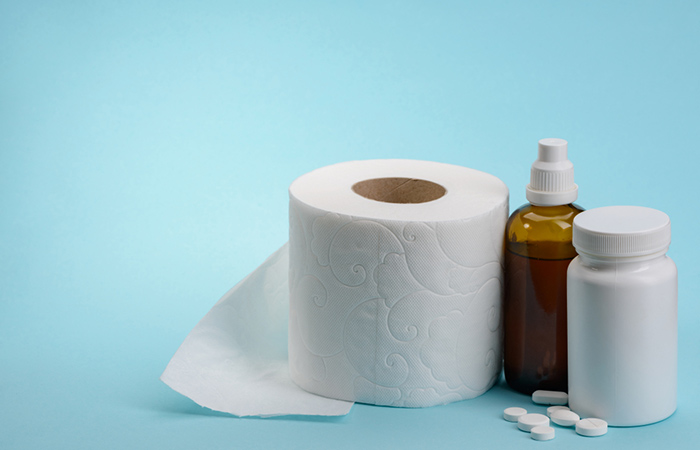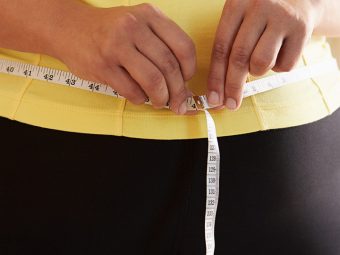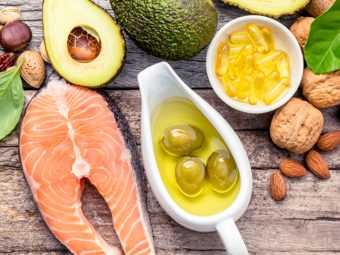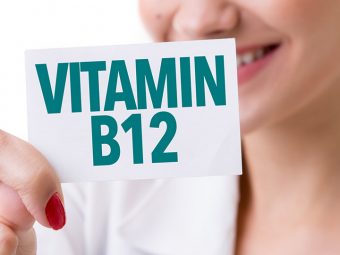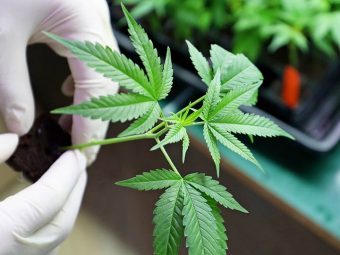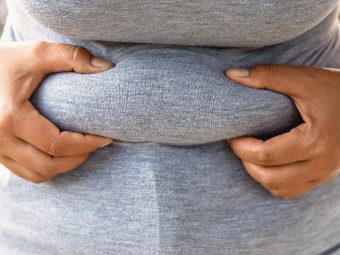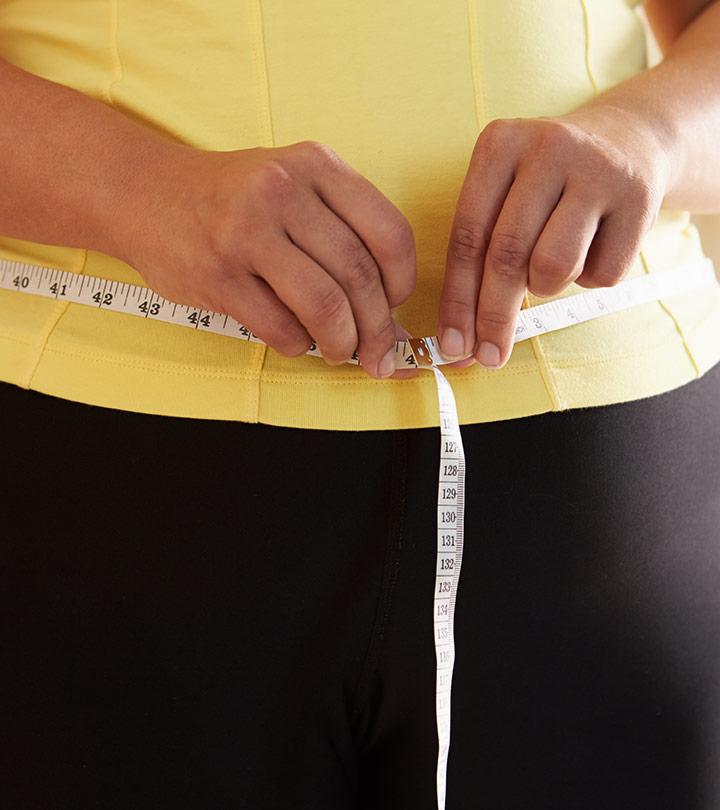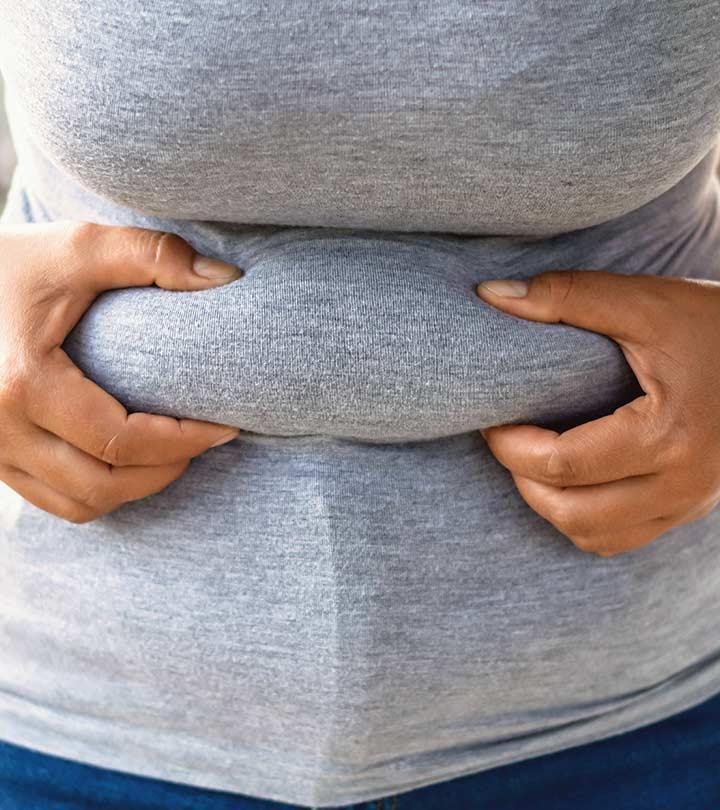Bloating Vs. Weight Gain – All You Need To Know
Understand the subtle differences in the causes and symptoms to get the right line of treatment.

Image: Shutterstock
Bloating is often mistaken as weight gain. But what is the difference between bloating and weight gain? First, bloating is temporary gas accumulation in your digestive tract. Second, it can make your tummy look swollen. On the other hand, weight gain occurs when you gain fat or muscle mass. That said, you may gain weight and also experience bloating. This may indicate an underlying health issue. Understanding the difference between bloating and weight gain is essential for accurately assessing changes in one’s body mass index. Read on to learn everything about how bloating and weight gain are linked. Scroll down to know more!
In This Article
Causes Of Abdominal Bloating
Bloating is primarily caused by gas accumulation in the gastrointestinal tract that runs from the mouth to the anus and includes the digestive system. A bloated stomach feels full, tight, uncomfortable, or painful (sometimes).
A study conducted on 88,795 patients found that 13.9% reported bloating in the last week. Out of the participants who had reported bloating, 58.5% never sought medical help and 29% of them reported using self-managing their bloating or not comfortable sharing symptoms with their healthcare providers.
It is a temporary condition often caused by certain foods you eat, especially those harder for the stomach to digest, which may even lead to fatigue at times. The most common reasons include (1):
- Consuming high-fiber foods like lentils, beans, and veggies like cabbage and Brussels sprouts
- Sugar and lactose intolerance
- Bacterial overgrowth
- Constipation
- Aerophagia (swallowed air) due to fast eating, smoking, drinking carbonated beverages, and chewing gum
In some cases, bloating could be a symptom of other medical conditions like (2):
- Infection or inflammation (such as a condition called diverticulitisi XInfection or inflammation of one or more pouches in the intestines which can result in nausea, pain, and fever. )
- Pelvic inflammatory disease (PID)
- Irritable bowel syndrome
- Blockage in your bowel or bladder
- Autoimmune conditions like sclerodermai XA rare and long-lasting autoimmune condition in which the skin and connective tissues become hard and tight.
 Trivia
TriviaDr Mehmet Yildiz, a health-focused blogger and scientist, shares how he dealt with bloating. He followed a customized diet based on eliminating certain foods for relief. He writes, “Some health conditions take longer to solve due to complexity. Usually, no single professional can solve complex issues as many specialists need to get involved in the process… I tried multiple avenues to solve my bloating and leaky gut problems (i)”.
Most of us often confuse bloating with abdominal fat gain. While both may make your tummy look bigger, there is a difference between the two. Let’s understand in detail.
Are You Fat Or Just Bloated? Difference Between Weight Gain And Bloating
Typically, belly fat is considered the first sign of weight gain. However, a swollen abdomen or belly can often result from bloating and not necessarily fat deposition. Here are a few differences between them to identify whether you are fat or bloated.
| Bloating | Abdominal Fat |
| It is localized. Only the stomach expands due to excess gas | It is widespread. You will notice excess fat on the abdomen, thighs, hips, and back. |
| The stomach feels tight. | The stomach feels soft and spongy. |
| It is not constant. The belly reduces once the gas is out. | It is constant and gradually builds up. |
| May cause abdominal pain and discomfort. | It is painless. |
| The body weight is unaffected. | The body weight increases. |
 Trivia
TriviaIn some cases, stomach bloating can also be due to the consumption of excess salt, which may lead to fluid retention or hormonal changes due to changes in menstrual cycle. You may even notice bloating right before (and during) your periods as the body retains water or due to constipation. Does bloating cause weight gain?” Let’s find out.
Signs That Water Weight Is Making You Bloat
Water retention may make you feel heavier than usual and bloated. Here are the signs to look out for:
- Constant boating, especially in the abdominal area
- Puffiness of the face, abdomen, and hips
- Swollen feet, legs, and ankles
- Stiff joints
- Weight fluctuations
- Skin indentation (when you press the skin for a minute)
Water retention can lead to bloating. But how much weight do you gain from it? Find out in the next section.
How Much Weight Can You Gain From Bloating?
The amount of weight gained due to bloating varies from person to person. Bloating typically leads to a temporary increase in weight due to the accumulation of gas or fluid in the digestive system. This can, at most, result in a few pounds of weight gain. However, this is not the weight of actual fat or muscle. An individual’s body weight returns to normal once the bloating is relieved through natural remedies or medical treatment. But if you experience persistent or unexplained weight changes, consult a healthcare professional to rule out any underlying health issue.
In most cases, the symptoms of abdominal bloating can be minimized or prevented by changing your lifestyle habits. Here are a few tips.
Ways To Prevent Bloating At Home

To reduce bloating:
- Stick to protein- and complex carbohydrate-rich foods.
- Eat slowly and chew your food properly.
- Limit the intake of carbonated drinks.
- Avoid excess intake of foods like lentils, dried beans, and vegetables from the cabbage family.
- Avoid chewing gum and drink water with a straw to avoid swallowing air.
 Trivia
TriviaMaintain a log of what you ate and how you felt after eating (bloated, uncomfortable) to determine the real cause of your bloating. If you struggle with bloating constantly, follow these tips.
Long-Term Solutions For Bloating
- Consume Probiotics

Probiotics contain gut-friendly bacteria and can help improve your digestion and prevent bloating. Include probiotic foods like yogurt/curd, kefir, sauerkraut, pickles, kombucha, kimchi, and buttermilk in your diet.
- Reduce Salt Intake
Excess sodium causes water retention, leading to a swollen and bloated feeling in the belly and other body areas, such as the hands and feet. Limiting the salt intake can get rid of bloating.
- Treatment And Medications
If an underlying condition causes bloating, it is best to consult a doctor. The doctor will diagnose the causes of bloating and suggest an individual treatment plan. They may conduct tests like endoscopyi XA procedure used to examine the insides of a cavity in the body or a hollow organ with the help of a thin and flexible device. , breath testing, and small intestinal imaging to diagnose the exact reason. Depending on the results, they may suggest OTC medications, dietary and lifestyle modifications, laxatives, antispasmodicsi XA class of drugs that inhibits the contraction of smooth muscles and helps relieve pain and discomfort. , antibiotics, and prokinetic agentsi XA class of drugs that increases the frequency of muscular contractions to promote the passage of ingested items in the digestive tract. (3).
In the next section, read about the warning signs that you should not ignore in serious bloating.
Warning Signs You Should Not Ignore In Case Of Serious Bloating
Consult a doctor immediately in case you experience severe bloating and the following symptoms:
- Weight Loss
If you notice sudden weight loss and bloating without dietary changes and exercising, consult a doctor. It could be due to tumors or overgrowth that press on the intestines, making you feel bloated or full after just a small amount of food.
- Severe Pain In The Abdomen
Severe abdominal pain and bloating, accompanied by nausea and vomiting may indicate a bowel obstruction. This requires immediate medical attention to avoid various complications. These obstructions can be painful because the bowel above the blocked area stretches as it gets filled with food and digestive juices, causing intense pain and digestive discomfort.
- High Fever
Fever that accompanies bloating is usually associated with some infection or inflammation.
- Blood In Stool Or Vaginal Bleeding
Conditions, such as vaginal bleeding between periods, blood in the stool, or postmenopausal vaginal bleeding, are associated with serious bloating. Consult a doctor immediately to rule out chances of gastrointestinal conditions and cancer, particularly uterine or colon cancer.
- Ascites
Ascites refer to a condition that causes fluid buildup in the abdominal cavity or pelvis area and causes bloating and weight gain. Ascites may indicate serious complications like liver disease, kidney failure, and cancer (4).
If you notice any of these symptoms or are taking medication that causes unwanted side effects, such as bloating and weight gain, it is recommended to consult your doctor. They may be able to treat the condition better by suggesting an alternative medication or treatment.
Summing It Up
Infographic: Are You Bloated Or Have You Gained Abdominal Fat?
Both bloating and weight gain increase the size of your tummy and may even lead to obesity or being overweight. While they are two different conditions, they could be mistaken for one another. Check out the infographic below to know the fundamental differences between bloating and weight gain.

Illustration: StyleCraze Design Team
The topic of bloating vs. weight gain is always hotly debated. However, we have identified some distinguishing characteristics. Bloating is caused by gas accumulation and does not contribute to weight gain. This momentary change can disappear once the gas is expelled from your system. However, persistent bloating and abdominal swelling accompanied by unexpected weight gain may indicate underlying medical conditions. Keep an eye out for the symptoms and warning signs mentioned in this article. Consult your health care provider if you notice any of these symptoms.
Frequently Asked Questions
Can fasting reduce bloating?
Yes, fasting may reduce bloating. Giving the digestive system a break of 12- 14 hours helps it to reset and aids in reducing bloating.
How long does it take to lose bloat?
Generally, it takes 24 hours to lose the bloat. However, for some people, it may take a little longer. If the symptoms persist even after 48 hours, it is safe to consult a doctor.
Does lemon water help with bloating?
Yes, lemon water can effectively manage bloating. Having it on an empty stomach reduces bloating and stimulates healthy bowel movements.
Does coffee cause bloating?
Yes, coffee may cause bloating in some people. The caffeine in it triggers spasms and causes bloating.
Is apple cider vinegar good for a bloated stomach?
No, apple cider vinegar may not help with bloating. There is no scientific evidence to support the claim that ACV relieves bloating.
Do bananas help with bloating?
Yes, bananas can relieve bloating. The potassium in them can help reduce bloating effectively.
Key Takeaways
- While weight gain and bloating may be linked at times, they are not the same.
- Stomach tightness, uneasiness, and sudden expansion of the stomach are more likely to be signs of bloating than weight gain.
- While exercise and a balanced diet can help reduce weight, intake of probiotics and less salty foods can help ease and prevent bloating.
Experiencing bloating and weight gain? Discover common causes, helpful tips, and effective remedies to tackle these uncomfortable issues in this informative video. Say goodbye to bloating and hello to a healthier you!
Personal Experience: Source
StyleCraze's articles are interwoven with authentic personal narratives that provide depth and resonance to our content. Below are the sources of the personal accounts referenced in this article.
i. Here’s How I Healed Abdominal Bloating and Distension.https://medium.com/sensible-biohacking-transhumanism/how-i-healed-abdominal-bloating-and-distension-12526a0c842c
References
Articles on StyleCraze are backed by verified information from peer-reviewed and academic research papers, reputed organizations, research institutions, and medical associations to ensure accuracy and relevance. Read our editorial policy to learn more.
- Gas and Bloating
https://www.ncbi.nlm.nih.gov/pmc/articles/PMC5350578/ - Pathophysiology Evaluation and Treatment of Bloating
https://www.ncbi.nlm.nih.gov/pmc/articles/PMC3264926/ - Pathophysiology Evaluation and Treatment of Bloating
https://www.ncbi.nlm.nih.gov/labs/pmc/articles/PMC3264926/ - Ascites: A Common Problem in People with Cirrhosis
https://gi.org/topics/ascites/






